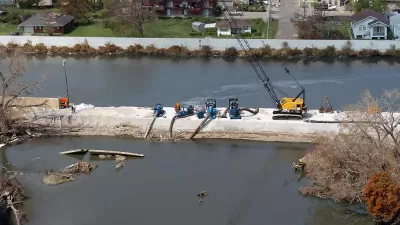Can Louisiana lawmakers succeed in retroactively overthrowing a lawsuit by the Southeast Louisiana Flood Protection Authority against 97 oil and gas companies, all while the state's coastline continues to disappear at alarming rates?
"The coast of Louisiana is crumbling into the Gulf of Mexico at an alarming rate. Over the last 80 years, it’s lost nearly 2,000 square miles. That’s as big as all of Rhode Island. Now a political fight has broken out in the state legislature over who’s going to help pay to try and repair the damage," says Gwen Ifill in introducing a report by Hari Sreenivasan.
Sreenivasan details the shocking scale of the losses, as well as causes like dams and levees that block replenishing sediment, sinking wetlands, rising sea levels, and 10,000 miles of canals dredged by oil companies.
The marshlands that have been destroyed by the oil company canals are of particular concern to New Orleans, for instance. Says Sreenivasan: "These marshes are not only a valuable ecosystem for the entire Gulf, but for hundreds of years, this huge network of wetlands has defended the city of New Orleans from major storms." The risk is such that "[last] July, alleging that the oil and gas industry’s damage to the wetlands made flooding in the city more likely, the flood protection authority sued 97 oil and gas companies."
Enter the state legislature: "lawmakers who support [the oil] industry have been crafting different bills to retroactively kill the lawsuit. A bill was introduced to limit which state agencies were allowed to bring lawsuits. Another bill changed how the flood control board was appointed. Another even challenged how that board hired its lawyers."
Developments are unfolding quickly: "The lawsuit suffered a blow when the state Senate passed a bill that would retroactively suspend the flood authority’s ability to sue. That bill is expected to be voted on later this week."
FULL STORY: As Louisiana’s coastline shrinks, a political fight over responsibility grows

Maui's Vacation Rental Debate Turns Ugly
Verbal attacks, misinformation campaigns and fistfights plague a high-stakes debate to convert thousands of vacation rentals into long-term housing.

Planetizen Federal Action Tracker
A weekly monitor of how Trump’s orders and actions are impacting planners and planning in America.

In Urban Planning, AI Prompting Could be the New Design Thinking
Creativity has long been key to great urban design. What if we see AI as our new creative partner?

Pedestrian Deaths Drop, Remain Twice as High as in 2009
Fatalities declined by 4 percent in 2024, but the U.S. is still nowhere close to ‘Vision Zero.’

King County Supportive Housing Program Offers Hope for Unhoused Residents
The county is taking a ‘Housing First’ approach that prioritizes getting people into housing, then offering wraparound supportive services.

Researchers Use AI to Get Clearer Picture of US Housing
Analysts are using artificial intelligence to supercharge their research by allowing them to comb through data faster. Though these AI tools can be error prone, they save time and housing researchers are optimistic about the future.
Urban Design for Planners 1: Software Tools
This six-course series explores essential urban design concepts using open source software and equips planners with the tools they need to participate fully in the urban design process.
Planning for Universal Design
Learn the tools for implementing Universal Design in planning regulations.
planning NEXT
Appalachian Highlands Housing Partners
Mpact (founded as Rail~Volution)
City of Camden Redevelopment Agency
City of Astoria
City of Portland
City of Laramie



























